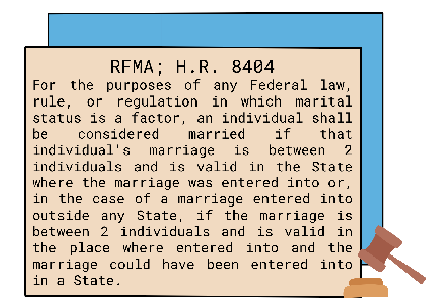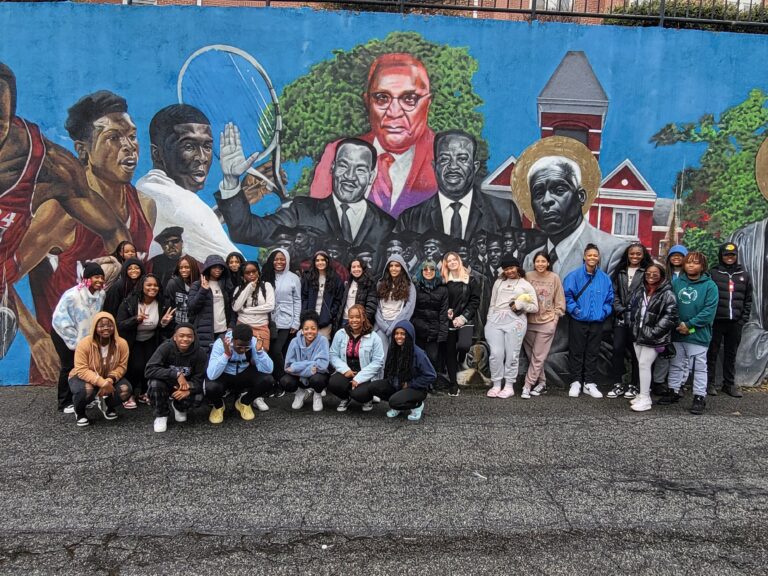Equal marriage act is signed into law by President Biden

By: Sonia Gidwani
Same-sex and interracial couples celebrated a victory on Dec. 13, 2022, when President Joe Biden signed The Respect for Marriage Act (RFMA; H.R. 8404) into law. Symbolizing a new era in politics, Congress passed this landslide bill with unlikely bipartisan support from 51 Republican Representatives and Senators, as well as 271 Democratic Congresspeople.
With the 2022 repeal of Roe v. Wade, conservative Supreme Court Justice Clarence Thomas brought attention to the notion of reconsidering other past rulings, such as Loving v. Virginia and Obergefell v. Hodges, that protected and adhered to the validity of interracial and same-sex marriages, respectively. Against Thomas’s preconceived beliefs, polls showed unprecedented support for marriage equality, which prompted the emergence of the RFMA bill. This new legislation protects federal recognition of both interracial and same-sex marriages across the United States. Despite overwhelming support in polls, the bill has been heavily criticized by activists because of its religious and state exemptions.
“I saw tears of joy that day as people celebrated basic human rights,” said U.S. Vice President Kamala Harris. “The right to be recognized as a family and the right to be with the person you love, whether at a military graduation, a hospital bedside or a naturalization ceremony.”
Even with the legalization of interracial marriage in 1967 and same-sex marriage in 2015, both topics have still been highly controversial. In 1996, President Bill Clinton passed the Defense of Marriage Act, defining marriage to solely be between one man and one woman and allowing states to not recognize same-sex marriages. This law successfully prevented legally married same-sex couples from receiving over 1,000 benefits available to other married couples under federal law. Some of the benefits denied included the right to live together in college or military housing, the right to inheritance, usage of a
spouse’s employment benefits, and recognition of the marriage itself. In 2015, with the Obergefell v. Hodges ruling, the U.S. Supreme Court established that the 14 Amendment requires all states to recognize same-sex marriages under the Equal Protection Clause. The RFMA officially repealed the Defense of Marriage Act and codified the 2015 Obergefell v. Hodges ruling to formally recognize same-sex and interracial marriages.
“Today, we stand up for the values the vast majority of Americans hold dear,” said Speaker of the House of Representatives Nancy Pelosi. “A belief in the dignity, beauty and divinity in every person and abiding respect for love so powerful that it binds two people together.”
In an era where many Republican House and Senate members are largely pushing toward anti-LGBTQ+ legislation, a remarkable 51 Republican Congresspeople voted in favor of the RFMA bill. The Senate passed the bill on Nov. 29, 2022, with both the House and Senate voting 258-169 in favor of the law.
“Civil rights are not a finite resource. We do not have to take from one group to give to another,” said Republican Representative of Utah Chris Stewart. “That is why I was proud to once again vote in favor of the Respect for Marriage Act. This is the best approach to protect all of our LGBTQ and religious friends and neighbors.”
“I saw tears of joy that day as people celebrated basic human rights: the right to be recognized as a family; the right to be with the person you love…”
-United States Vice President Kamala Harris.
While the Respect for Marriage Act is considered monumental, it has also been heavily criticized by activists for including multiple exemptions. The RFMA requires federal and state recognition for same-sex marriages, but it does not force states to supply same-sex marriage licenses. Rather, all states must only recognize marriages performed in states that do provide licenses. Additionally, it does not prevent any states from passing discriminatory laws to restrict access to marriage licenses. The majority of criticisms stem from the act’s exemptions for religious and nonprofit organizations, protecting these groups from being forced to support same-sex marriages. Religious organizations, including educational institutions and places of worship, are not required to celebrate or recognize any marriage that conflicts with their faith. These institutions have the ability to deny “services, accommodations, advantages, facilities, goods, or privileges for the solemnization or celebration of a marriage.” However, these measures have helped the law gain support from numerous religious groups, including the Church of Jesus Christ of Latter-day Saints, The Evangelical Lutheran Church in America, and the Presbyterian Church of America.
“The House-passed legislation raised concerns among many about protecting religious freedoms, which is why my colleagues and I worked to strengthen those protections in the substitute amendment,” said Republican Senator Shelley Moore Capito, who voted in favor of the act. “I will be supporting the substitute amendment because it will ensure our religious freedoms are upheld and protected, one of the bedrocks of our democracy.”
While there are criticisms of this act from both political and religious groups, many have celebrated the RFMA bill as a significant step toward marriage equality for all. The codification of this ruling officially advances protections for tens of millions of individuals and demonstrates progress in civil justices.
“Today is a good day,” said President Biden. “A day America takes a vital step toward equality, toward liberty and justice, not just for some, but for everyone. Toward creating a nation where decency, dignity and love are recognized, honored and protected. Today we celebrate our progress.”


